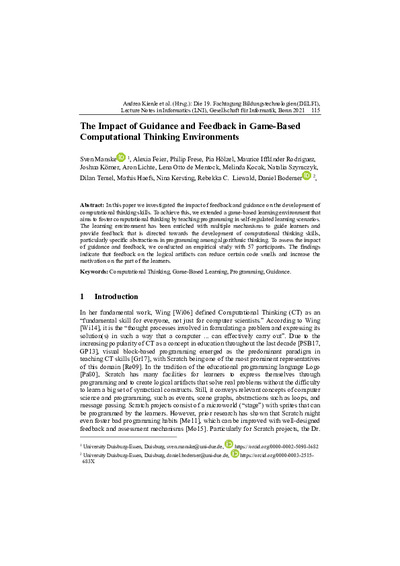 Diese Seite wurde seit 1 Jahr inhaltlich nicht mehr aktualisiert.
Unter Umständen ist sie nicht mehr aktuell.
Diese Seite wurde seit 1 Jahr inhaltlich nicht mehr aktualisiert.
Unter Umständen ist sie nicht mehr aktuell.
 Zusammenfassungen
Zusammenfassungen
 In this paper we investigated the impact of feedback and guidance on the development of computational thinking skills. To achieve this, we extended a game-based learning environment that aims to foster computational thinking by teaching programming in self-regulated learning scenarios. The learning environment has been enriched with multiple mechanisms to guide learners and provide feedback that is directed towards the development of computational thinking skills, particularly specific abstractions in programming among algorithmic thinking. To assess the impact of guidance and feedback, we conducted an empirical study with 57 participants. The findings indicate that feedback on the logical artifacts can reduce certain code smells and increase the motivation on the part of the learners.
In this paper we investigated the impact of feedback and guidance on the development of computational thinking skills. To achieve this, we extended a game-based learning environment that aims to foster computational thinking by teaching programming in self-regulated learning scenarios. The learning environment has been enriched with multiple mechanisms to guide learners and provide feedback that is directed towards the development of computational thinking skills, particularly specific abstractions in programming among algorithmic thinking. To assess the impact of guidance and feedback, we conducted an empirical study with 57 participants. The findings indicate that feedback on the logical artifacts can reduce certain code smells and increase the motivation on the part of the learners. In this paper we presented an extension of the game-based learning environment ctGameStudio. The new version includes feedback and guidance components that analyse the learner's code and provide appropriate guidance that improves learning, particularly the inspection, reflection, and evaluation of own logical (code) artefacts. We hypothesized that this would result in higher performance regarding computational thinking.
In this paper we presented an extension of the game-based learning environment ctGameStudio. The new version includes feedback and guidance components that analyse the learner's code and provide appropriate guidance that improves learning, particularly the inspection, reflection, and evaluation of own logical (code) artefacts. We hypothesized that this would result in higher performance regarding computational thinking.The results regarding the differences in the performance parameters between two groups showed no significant improvement in most performance parameters. However, the significant mean difference in number of duplicate blocks shows that the concepts are well explained to the participants and that the acquired knowledge can be transferred. In addition, there is a tendency for the feedback group to take a bit more time and complete slightly fewer levels, which can be explained by the fact that the participants had to deal with the feedback and interact with the component. However, these differences are not significant. Additionally, a significant improvement of the flow could be observed in the feedback group. Flow is repeatedly described in literature as a particularly important factor in the learning process, so that this result is an indication that the changes to the game experience were effective.
Since there is a considerable amount of literature on the benefits of formative and summative feedback in gaming-based learning environments, e.g. [Gr18, LK11], the reason for the small group differences regarding the performance of the learners may be due to the implementation of the feedback system and the design of the study. Even though there were small performance improvements in the feedback group, there were no significant differences in the ctscore. The ratios of the parameters for the calculation of the score may need to be revised. Although, ctGameStudio is created for first-time game-based learning of CT the participants of the study had a high heterogeneity in terms of programming experience, which may have led to mixed results. Since the game was only played for 45 minutes and it takes extra effort to read the feedback dialogs, the benefits might only be realized with longer observation.
 Dieses Konferenz-Paper erwähnt ...
Dieses Konferenz-Paper erwähnt ...
 Personen KB IB clear | Harold Abelson , Michal Armoni , Mordechai Ben-Ari , Karen Brennan , Andrea diSessa , Evelyn Eastmond , Charles B. Hodges , Yasmin B. Kafai , John Maloney , Orni Meerbaum-Salant , Amon Millner , Andrés Monroy-Hernández , Jesús Moreno-León , Seymour Papert , Mitchel Resnick , Peter J. Rich , Gregorio Robles , Eric Rosenbaum , Natalie Rusk , Jay Silver , Brian Silverman , Jeannette M. Wing | ||||||||||||||||||||||||||||||||||||||||||||||||||||||
 Begriffe KB IB clear | code smells
, computational thinkingcomputational thinking
, Dr. Scratch
, game-based learninggame-based learning
,  Lernen Lernen learning
, learning
,  Motivation Motivation motivation
, motivation
,  Programmieren Programmieren programming
, Selbstreguliertes Lernen programming
, Selbstreguliertes Lernen
| ||||||||||||||||||||||||||||||||||||||||||||||||||||||
 Bücher |
| ||||||||||||||||||||||||||||||||||||||||||||||||||||||
 Texte |
|
 Tagcloud
Tagcloud
 Zitationsgraph
Zitationsgraph
 Zitationsgraph (Beta-Test mit vis.js)
Zitationsgraph (Beta-Test mit vis.js)
 Volltext dieses Dokuments
Volltext dieses Dokuments
 |  The Impact of Guidance and Feedback in Game-Based Computational Thinking Environments: Konferenzbeitrag als PDF ( The Impact of Guidance and Feedback in Game-Based Computational Thinking Environments: Konferenzbeitrag als PDF ( : :  , 279 kByte; , 279 kByte;  : :  ) ) |
 Anderswo suchen
Anderswo suchen 
 Beat und dieses Konferenz-Paper
Beat und dieses Konferenz-Paper
Beat hat Dieses Konferenz-Paper während seiner Zeit am Institut für Medien und Schule (IMS) ins Biblionetz aufgenommen. Beat besitzt kein physisches, aber ein digitales Exemplar. Eine digitale Version ist auf dem Internet verfügbar (s.o.). Es gibt bisher nur wenige Objekte im Biblionetz, die dieses Werk zitieren.















 Biblionetz-History
Biblionetz-History